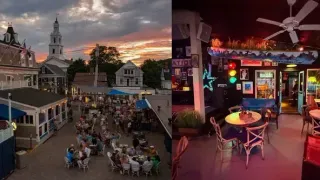January 23, 2015
Ken Urban Reconciles Contradictions in 'A Future Perfect'
Michael Cox READ TIME: 8 MIN.
EDGE readers may be familiar with Ken Urban from the tantalizing film adaptation of his play "The Happy Sad," where a quartet of 20-somethings hop in and out of bed talking of monogamy while exploring bisexuality. Or perhaps they're familiar with the recent New York production of his play "The Correspondent," which The Advocate said contains "the season's most graphic sex scene."
Electronic music enthusiasts may know that Urban formed the rock group Occurrence (in addition to writing a lot of music for his own plays) and they may be familiar with his garage band in a home office sensibility. (How can you overlook a band with lyrics like "you're the kind of guy who cries when he masturbates, as he thinks of his dad and his mom"?)
Urban's latest play, A Future Perfect, is having its premiere production at the Speakeasy Stage Company through February 7. And it promises to toe the line between two opposing forces: The revolutionary spirit of an indy-rocker and the buttoned-down (oh, so traditional) expectations of the "new normal."
This semi-autobiographical play, about a band Urban had in Cambridge during the time he taught at Harvard, is set in the fall of 2011 and deals with the way two couples must re-evaluate their values when one couple announces that they're having a child.
EDGE: This is the second new play Speakeasy has developed this year. That's new for them.
Ken Urban: It's a huge economic risk for theatre companies to do new works. I'm feeling a little pressure. I want to show Boston how sexy and exciting new plays are. It like going to a concert at a venue you trust but you've never heard of the band, or maybe you listened to a shitty mp3 on Spotify. When something's a known quantity... when the New York Times says it's a good play, you're like, 'Oh, we have to go, because Ben Brantley likes it.'
EDGE: How do you think audiences will react to this play?
Ken Urban: Speakeasy audiences tend to be gay dudes in the South End. On the surface this show may not be about gay dudes that live in the South End, but I know it'll speak to them.
EDGE: The characters in this play are straight, but the questions the play asks are universal.
Ken Urban: I decided as a gay man that I wasn't going to have children and I've stuck with it. There's a point in all of our lives that we step back and say, "I believe this. But I do that. How do I reconcile these contradictions?" That's really what this play is about. It's about a belief. And our politics.
EDGE: For instance?
Ken Urban: Being gay for me, when I came out, wasn't about whom I wanted to have sex with. I went to a school where I was the only out gay man for the entire four years I was there. Being gay was about politics. It was about wanting to be an outsider and embracing that. It was about fighting for liberal values, and saying no to conservatism, and racism, and believing in feminism. But then you grow up and you wonder what happened to that idealism.
EDGE: Speaking of politics, do you think the issue of Marriage Equality mirrors this idea of having children in your play?
Ken Urban: It took me a long time to get married. I'd been with my partner --14 years? -- before I decided to do it. I thought I don't want that life. In a way, marriage is something that's predetermined and you have to find out how you fit into that definition. I just wasn't comfortable with the M-word. I do a lot of things well, but monogamy is not one of them.
This play is timely to gay men and women because we're facing the same questions straight people have. If you date someone for three months now your friends are like, 'When are you getting married?' Until 5 or 6 years ago, I used to feel sorry for straight people. I thought, 'God you have all this pressure to get married and have children. I'm a gay man and I don't have to worry about that shit.' Now... be careful what you wish for.
EDGE: You've got a great cast: Marianna Bassham, Nael Nacer and Chelsea Diehl.
Ken Urban: Brian Hastert is from New York. There's a very romantically intense scene it this play. That requires actors to be incredibly brave. Brian Hastert is... There's a table scene... Yeah. That's all I'm going to say about that.
EDGE: What?
Ken Urban: The gay dudes in the South End won't be disappointed.
EDGE: Do you think the play is good enough that bad actors could do it?
Ken Urban: No. I write plays that are hard for actors. When I write, I see it as a score. There's a strong rhythm and strong actors pick up on that. I'm writing about people who are really close and have been in each other's lives for a long time. The minute these actors come onstage they need to have an intimacy with each other that says, 'We've been friends a long time, we trust each other and we can say awful things to each other, but we have a history... and that makes it alright.' That's hard for actors to do. To be both funny and heartbreaking requires incredible acting. I love actors, but I put them through hell.
EDGE: You say you hate irony in plays, but you have to admit this play is ironic.
Ken Urban: We see a lot of these plays in New York where everything's in smart quotes. And just jokey for the sake of being jokey, and there's no belief. There's no putting yourself at risk. I like plays where the characters are put in a risky ethical place, and they have to ask questions about themselves. Even if it makes them feel uncomfortable.
EDGE: What kind of theatre inspires you?
Ken Urban: Just going to the theatre in London was so exciting. It was these small theaters, you could pay �5 to see a play, everybody was naked and doing terrible things to each other. I could bring my beer in there. It was such a social, fun thing. I don't think I would be in the theater if my first experience was in the United States. If someone had taken me to Lincoln Center when I was 18, I would be like, 'Fuck this. This is for rich white people. I don't want any part of it.' When I see theatre in small spaces, it's like going to see a band play. It's an intimate, fun experience. And that's not ironic. Bands are not being ironic. They can't be.
EDGE: How do you mean? Why can't they?
Ken Urban: When you're in a band you're just putting your ass out there, unlike theatre audience where people at least pretend to be polite -- well not any more; now they just start Tweeting in the middle of a show -- when you're in a band people will start yelling and throwing bottles. Especially when it's something, some song, you wrote. A band just gives themselves to the audience. I don't think you can do that ironically. It's like sex.
EDGE: I must be doing it wrong.
Ken Urban: Good sex. You can't be thinking about grocery list when you having sex.
EDGE: I'll take your work for it.
Ken Urban: You could, but you're not having good sex if that's what you're thinking about. Now, there's a difference between irony and cynicism. Irony means you secretly believe; cynicism is when you've given up. People ask me, 'Why don't your characters believe that change is possible?' And I say, 'They do. But every time they believe change is possible it turns into shit.'
The irony of my characters is we like to act like we don't care, but we do. We've seen what it's like when Baby Boomers get elected. We've seen what happens when our parents started buying microwaves and Volvos and gave up on their '60s idealism. My parents used to be Democrats and then something happened with Reagan and they became rabid, rabid Republicans. That's where I think the irony in this play comes from.
EDGE: Do you feel the same naked, vulnerability watching other people perform your plays as you do when you perform a song?
Ken Urban: God, yes. All the time. But then there are these moments... During a reading of this play, there were some people in the audience, who are nothing like the characters in this play, and I noticed they were crying.
In a way, theatre is more important now than it was 20 or 30 years ago, because these damn devices that we all depend on, that supposedly make us more connected, actually make us more removed. People really crave to be alone in a room with other people and experience something together; a story, the journey of a character. It's very communitarian and people miss that. That's the magic of theatre: you sit in a dark, dingy room with a bunch of people you don't know and you have an experience together. And when it's good it's better than anything else.
A Future Perfect continues through February 7 at the Boston Center for the Arts. For tickets and more information, visit the SpeakEasy Stage website.






